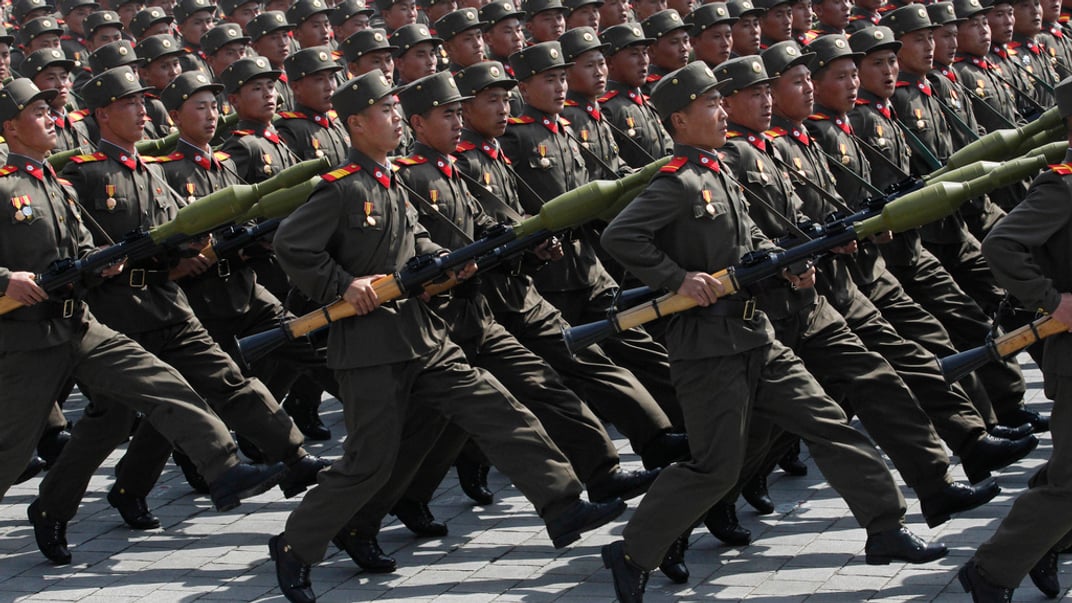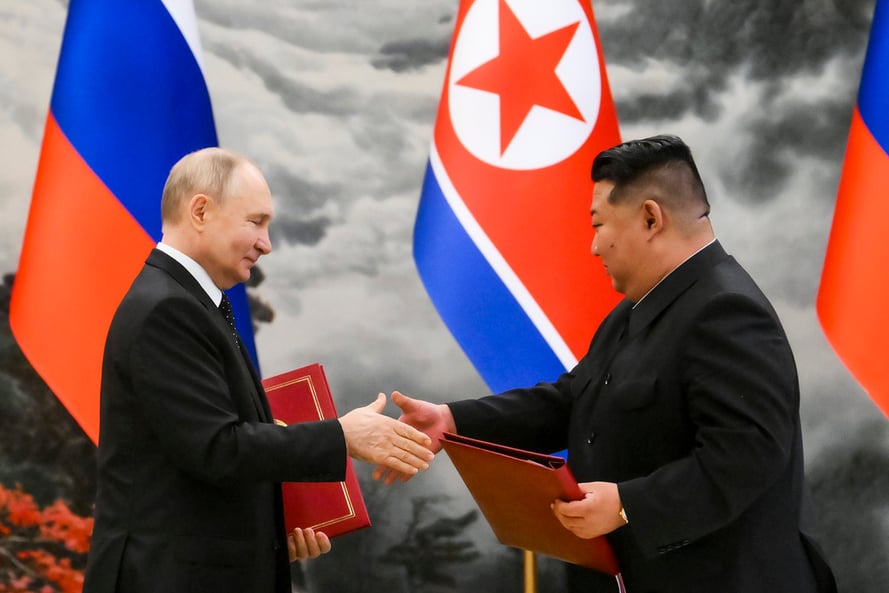From Pyongyang to Kursk: Why North Korea is sending troops to fight in Ukraine and how to respond to this situation.

Motivation and Language Barrier
The military cooperation between Russia and North Korea intensified in the second year of Russia's full-scale invasion of Ukraine: Vladimir Putin reached out to the North Korean leader as his stockpiles of Soviet missiles and artillery shells were depleting. Kim Jong-un did not deny his fellow dictator: arms production is perhaps the only profitable sector of North Korea's economy.
According to estimates from South Korean intelligence, since the beginning of the full-scale invasion, North Korea has supplied over 8 million 122mm and 152mm artillery shells to Russia, as well as Bulsae-4 anti-tank missiles, KN-23 short-range ballistic missiles, and ammunition for handheld anti-tank grenade launchers. When North Korean shells and ballistic missiles began raining down on Ukrainians, few could have imagined that this was just the first phase of North Korea's involvement.
On one hand, the participation of North Korean troops in the war against Ukraine could indicate significant losses for the Russian army and challenges with replenishing its ranks. On the other hand, the North Korean army is the fifth largest in the world in terms of personnel, making its involvement in the war against our country a real threat.
Overall, the armed forces of North Korea number 1.28 million servicemen, with 1.1 million in the ground forces alone. The army in North Korea is conscription-based, consisting of both men and women. Mandatory service lasts 10 years for men and 5 years for women. In a country with a population of 26 million, there are 120,000 trained special forces fighters.
“Monthly losses of the Russian army in Ukraine exceed 30,000 killed and wounded. Therefore, the Russians need about 30-35 thousand recruits to compensate for the losses. They are currently facing recruitment issues. It is no coincidence that they have raised the bonus for signing contracts with the armed forces to $35,000.”
“Thus, Russia is not averse to utilizing Koreans. However, the current involvement cannot be considered a factor that could radically change the troop numbers of Russia in its confrontation with Ukraine,” noted Mikhail Samus in a conversation with a Polish military analyst.
The effectiveness of involving North Korean military personnel in modern warfare remains to be determined. It is uncertain how they will perform when their units suffer heavy losses on the battlefield. However, the military analyst believes the language barrier is not likely to be an obstacle.
“The language factor is not difficult to overcome. For instance, Koreans can fight in regiments. In this case, communication with the Russian army will occur at the regiment staff level, and the language barrier will not hinder coordination. Problems may arise if North Korean soldiers are integrated into Russian units,” explains Samus.
The head of GUR, Kirill Budanov, is confident that North Korean soldiers will have high motivation on the battlefield: if they fail to meet their command’s expectations, their families could face execution.
Why is North Korea Helping Russia?
The first reports of North Korean servicemen directly participating in the war against Ukraine on the side of Russia began to emerge from the National Intelligence Service of South Korea in August 2024. These involved military advisors and specialists aiding the Russians in servicing North Korean ballistic missiles.
According to data from South Korean intelligence, Kim Jong-sik, the first deputy head of the Department of Munitions Production and a key figure in North Korea’s missile program, has visited the launch site for the North Korean KN-23 ballistic missiles near the Russian-Ukrainian front multiple times. Kim Jong-sik traveled to Russia with dozens of North Korean officers, advising his Russian counterparts on-site.
Moreover, the Russians are likely utilizing the services of North Korean engineering troops. During the Korean War from 1950-1953, the North Korean army pioneered what is known as tunnel warfare: its engineering brigades built barracks and command posts underground. Tunnels at a depth of about 100 meters protected troops from air and artillery strikes and were also used to infiltrate the enemy's rear. The Russian army used elements of tunnel warfare during last year’s battle for Avdiivka: the occupiers penetrated into the Ukrainian rear by moving underground.
In exchange for military assistance, Russia provides North Korea with food, fuel, money, and technology for developing nuclear weapons, stated Kirill Budanov in an interview with the Economist.
Cooperation between Russia and North Korea continues under an agreement on strategic cooperation signed in June this year during Vladimir Putin's visit to North Korea. According to data from the Wall Street Journal, there is a secret clause regarding the participation of North Korean military personnel in the war against Ukraine.

China's Cerberus and Arms Factory for Russia
North Korea is not an independent geopolitical player—it is more of a proxy for China, just like Russia itself, believes Mikhail Samus. Both Mikhail Gonchar, an expert on energy and security relations, and Samus doubt that Kim Jong-un can make significant foreign policy decisions without Beijing's blessing.
“North Korea's GDP does not exceed a few billion dollars. The economy is 90% dependent on China. It is laughable to suggest that North Korea can diversify its relationships at Russia's expense. Kim Jong-un does nothing that could provoke dissatisfaction from Xi Jinping. Pyongyang cannot act freely on the European continent without directives from Beijing,” noted Gonchar in a conversation with Hromadske.
Any reports of disagreements between Beijing and Pyongyang are viewed by Gonchar as disinformation aimed at confusing the West. He asserts that in the so-called axis of evil, there is “complete synergy of efforts and all roles are outlined.”
“Currently, the axis of evil consists of an alliance between China, Russia, North Korea, Iran, and Belarus. China remains in the shadows, proposing various peace initiatives, while North Korea is assigned the role of Cerberus. Each member of this coalition acts in a manner acceptable to them. The situation demands a strong reaction from the West, but so far, we see nothing beyond deep concern,” Gonchar emphasized.
A Russian victory is in China's interests, as the occupation of Ukraine would open doors for direct access to the European market, adds Mikhail Samus. Therefore, Pyongyang's support for Moscow is not a coincidence.
With China's assistance, Russia has turned North Korea into a weapons production factory, investing Chinese yuan into the development of the North Korean military-industrial complex, which Moscow receives from selling Russian energy resources to Beijing. Moreover, North Korea receives technologies from Russia and machinery and components for weapon production from China.
In fact, North Korea is currently experiencing its “golden age.” The war is generating revenue for the militaristic regime in Pyongyang, whose incompetent economic policies have repeatedly led to famine among the oppressed citizens of North Korea.
Weak Western Response and Assistance from South Korea
The involvement of North Korea in the war opens up opportunities for Ukraine: the outlines of a new alliance between Ukraine and South Korea are emerging on the horizon. The rapprochement between Russia and North Korea poses a threat not only to Kyiv but also to Seoul. South Korea is compelled to act decisively, as the tightening of the totalitarian neighbor is not in its interest.
Currently, the South Korean government is considering sending military personnel to Ukraine to identify North Korean soldiers and analyze the tactics used by North Korean army units. Furthermore, Seoul does not rule out supplying defensive and offensive weapons to Ukraine, stated Kim Tae-hyo, Deputy National Security Advisor of South Korea.
South Korea ranks among the top ten largest producers and exporters of weapons in the world. The South Korean army possesses a range of effective air defense systems, including the Cheongung-II medium-range missile system, which could help Ukraine defend against Russian and North Korean ballistic missiles.
In general, South Korea has much to offer Ukraine: from aircraft to 155mm artillery shells of its own production that could neutralize the Russian advantage in munitions, says Mikhail Samus. However, so far, Seoul has only provided Kyiv with non-lethal assistance and humanitarian support.
“South Korea could rapidly equip the brigades of the Armed Forces of Ukraine that currently need reinforcement by transferring tanks of its own production and excellent self-propelled artillery systems from its military warehouses. Seoul can send Kyiv virtually the entire range of weapons needed for conducting intensive warfare. Unlike our European partners, South Korea has not been idle for 30 years but has been producing weapons,” notes the military analyst.
The West could also give a strong response to the entry of North Korean troops into the war by blocking the transportation of Russian oil through the Baltic Sea. This route is how Russia sells at least half of its oil. The deficit of Russian oil in global markets could be compensated by Saudi Arabia, which has already announced its intention to increase production. The Saudis have every capability to do so, assured Mikhail Gonchar. But the West has yet to